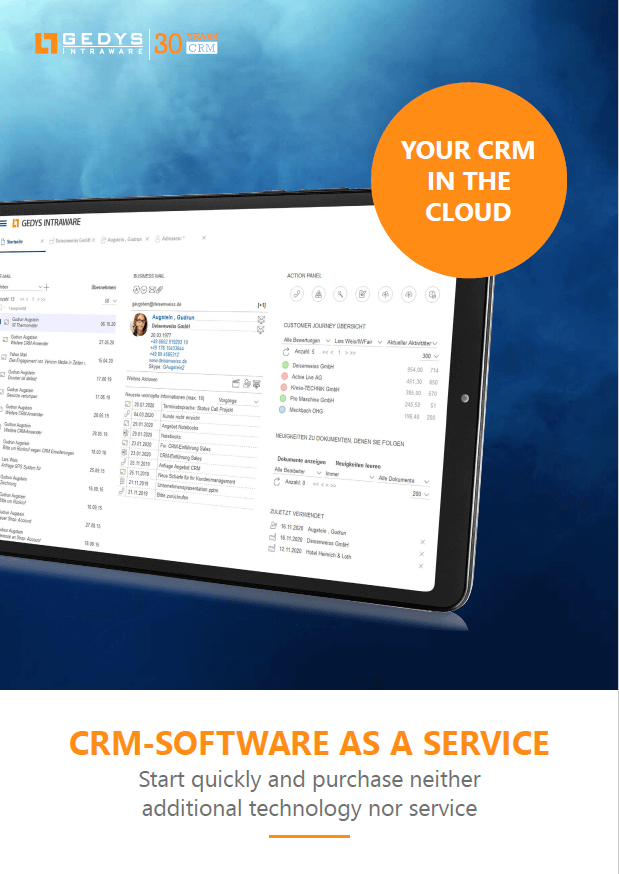Is the software also available as CRM SaaS?
CRM Saas (short for CRM as software-as-a-service) has a lot to offer. Suspiciously eyed some time ago in Germany, more and more companies are switching to this model here.
Can the model also be something for your company? Read here some facts for and against. If your questions are not fully answered, call.
Table of Contents
What is CRM SaaS?
CRM-SaaS is an operating model for CRM softwarethat runs in the cloud. The cloud CRM and the associated IT infrastructure are operated and made available by an external service provider.
No additional IT resources are required in your own company to use the CRM software. The calculation is usually in the form of a monthly rental price per user.
What are the benefits of CRM SaaS?
Is it more useful to use CRM software as a cloud solution or to opt for an in-house installation (on premise)? The current trend shows that companies are increasingly appreciating the benefits of CRM SaaS.
The motives are manifold. A key advantage of SaaS CRM is that you can access powerful applications directly from the Internet without having to manage expensive hardware installations or software updates.
1. Cost savings
The introduction of CRM involves investments in licenses and the necessary IT infrastructure, such as servers or administration personnel. The cloud model has the advantage of eliminating these initial investments. The monthly fee per user can be calculated firmly and easily adjusted for changes in the number of users.
Please note in your cost statement that you also consider purchasing the necessary hardware, services and employees. It often turns out that the CRM-SaaS approach is actually a more cost-effective option and is therefore especially considered by medium-sized companies.
2. High security
CRM hosting providers have a sophisticated security concept due to their many years of CRM practice. This protects data better in the cloud than some companies without adequate IT skills. The costs are lower than for own operation.
Your CRM SaaS provider takes care of everything from updates and data security to hardware maintenance.
3. Short project duration for CRM SaaS
IT projects are often shorter, eliminating the need to procure hardware and qualified IT personnel.
4. Seamless availability: 24/7
By using a cloud CRM, you can access your data anytime, anywhere, once you’re connected to the Internet. Your data is accessible across all your devices, whether on your desktop, tablet or smartphone.
5. Independence from classic release cycles
Within a short period of time, updates or small improvements can be live-streamed so that you can see the result directly in your application. Without update. However, possibly with restart or unsubscribe.
6. Quickly integrate more cloud services
An important advantage of the CRM application in the cloud is the ability to quickly integrate additional cloud solutions into the business application.
7. Quick and easy to scale
If your company decides to increase the number of CRM users, it will be done within a day – without installing software, waiting times, testing, etc. You simply change your subscription and your provider gives the new user access to your CRM solution.
This process is the same for additional storage space and service. All at a speed that companies love so much about this model.
Are there any drawbacks to CRM SaaS?
Do you need your CRM offline?
The Internet is not yet widespread in Germany. As soon as your field service needs to work in a radio hole, you need an appropriate offline client.
Is a dedicated server part of your security claim?
There are few CRM SaaS providers that provide you with their own server. Typically, multiple companies work on a common server. Formulate your questions accordingly to the CRM SaaS service provider.
What is your conclusion?
Companies around the world are going to the cloud, where they can easily rent CRM SaaS and enjoy a worry-free working life.
Companies are therefore turning to CRM SaaS:
- It saves money. SaaS systems are more cost-effective than on premise systems and involve lower operating costs. No infrastructure, servers, upgrades, or maintenance is required by your company.
- It saves time. Setup and upgrades are usually easier, faster, and more efficient.
- It facilitates cooperation. Authorized people can access CRM software and data from anywhere they have an Internet connection.
- It adapts to the trends. You can easily pick up on current trends such as mobile strategies or omni-channel integration.

